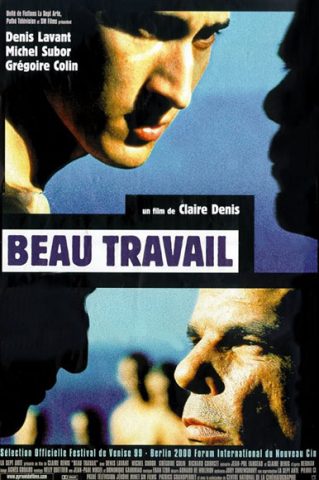 Beau Travail
Beau Travail
Directed by Claire Denis
Written by Claire Denis and Jean-Pol Fargeau
based on a story by Herman Melville
Released May 3, 2000
Drama (foreign/France)
92 min.
Review by Stephen O. Murray
May 18, 2000.
Claire Denis understands that outsiders make waves just by their presence.
—Charles Taylor
I felt that knowing that Beau Travail [2000] is based on Billy Budd got in the way more than it helped, at least until I heard other viewers who could not figure what had been going on in the film.
The Claggart character [Denis Levant] does not seem to be infatuated with the Russian-born foundling Billy [Grégoire Colin], merely jealous that both the men and the commandant like him. (He claims the men haven fallen under the newcomer’s spell, though this is not apparent in what we see—i.e., the verbal perspective is that of the resentful sergeant, but what we see doesn’t match this, is not visibly shot from his perspective). Rather than accidentally killing Claggart, Sgt. Galoup puts Sentaine out in the desert to die (first it seems he does, then it seems he doesn’t). Most of the speech in the film is Galoup’s voiceovers, which make it clear that he set out to trap Sentain so he’d have an excuse to punish him (with deniability about executing him), but his motivations remain opaque (not least to himself: he’s not introspective).
Although Sentain is not supposed to be a native speaker of French (and is coached on the names of articles of clothes being taken down from the clothesline early in the film), he definitely does not stutter like Billy. He is as able to express himself as the other legionnaires. (And is the only one who is called upon to do so, in a colloquy with the commandant.) He does not seem particularly angelic. Claire Denis has said she does not believe in innocence or purity, and the French Foreign Legion is legendarily a refuge for those with pasts they want to forget, but other than the poverty of Russian soldiers, the audience learns nothing of any of the characters’ motivations for joining up and living the disciplined life of a particularly remote outpost (Djibouti, formerly French Somaliland—I didn’t know there were any East African French colonies, let alone that any place still is). It only seems to be a human void, but it sure is striking (rocks, salt flats, mountains, islands, ocean). The Africans wear colorful clothes; their amusement at the crazy Europeans straining senseless under a blisteringly hot sun are occasionally registered.
 The uninterest in motivation and speech, the striking images (cinematography by Agnes Godard of straining muscles and stark desert islands), the use of sound (including some intense choruses from Britten’s “Billy Budd,” a Neil Young song, African pop songs, and a disco chanteuse singing in English as Galoup moves by himself in Marseilles at the end) reminded me of Michelangelo Antonioni, though it’s hard to imagine him focusing on an all-male society.
The uninterest in motivation and speech, the striking images (cinematography by Agnes Godard of straining muscles and stark desert islands), the use of sound (including some intense choruses from Britten’s “Billy Budd,” a Neil Young song, African pop songs, and a disco chanteuse singing in English as Galoup moves by himself in Marseilles at the end) reminded me of Michelangelo Antonioni, though it’s hard to imagine him focusing on an all-male society.
The young, fit men in tight short shorts and boots is like catnip to a thigh man like me (there are plenty of shirtless men for those mesmerized instead by male tits). With shaved heads, it’s difficult to tell them apart (except for the black ones; the Vietnamese one is only slightly different in appearance (the butterfly upper lip, mainly). They train hard, but also concentrate on “women’s work” (cooking, making beds, washing clothes, and, especially, ironing perfect creases…with their boots and shorts…ooooh!). Yielding to “the rigid fetishism of order right on the edge of [emotional] chaos” indeed!
For the Russian, the Africans, and probably others, a lack of economic opportunities must constitute part of the motivation, and I also think there is some choice to be in an all-male world involved.
At the urinals afterward, I heard that it was a film “about testosterone.” Denis Levant clearly has too much of that substance, most vividly in leading push-ups, but there is not a contest of wills (or anything else) between Claggart and Billy, Galoup and Sentain. Billy and Sentain do not know they are in a contest. Particularly, they do not know that they are winning a contest for the affection of the commander (an insanely doomed contest for unlikable martinets like Claggart and Galoup to enter!). And they are not sufficiently heroic for their losses to come across as tragic.
18 May 2000
©2000, 2016, Stephen O. Murray

